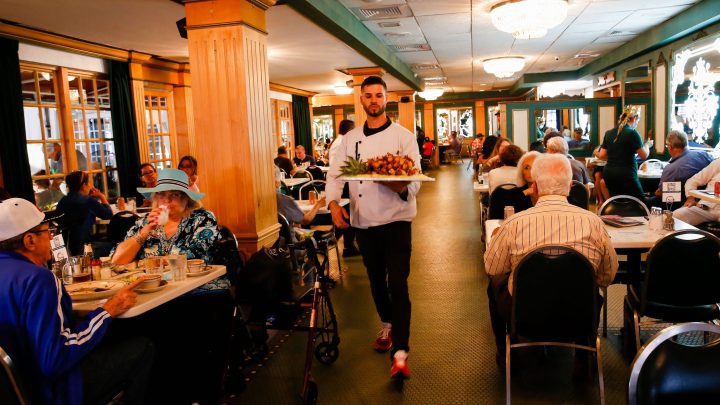
Washington, D.C., is a test case for phasing out the tipped minimum wage
Washington, D.C., is a test case for phasing out the tipped minimum wage

How should waiters, bartenders and other tipped employees be paid? And how much?
Many states have been grappling with this question recently as they decide whether or not to get rid of the tip credit system. That’s where restaurants don’t have to cover all of an employee’s minimum wage if tips make up the difference. It’s an ongoing battle between labor groups and restaurants. One place that is something of a test case is Washington, D.C., which recently started phasing out the tip credit.
“Brian” has worked in restaurants in the city for 16 years. “It’s my full-time thing. I’ve been in the restaurant industry since I was 18,” he said.
We’re going with the name Brian because the two restaurants where he works would fire him for talking to a reporter about this issue, he said.
In 2022, voters in the nation’s capital approved a ballot measure that would eliminate the tip credit. “I was definitely in favor,” he said.
Since it started to come into effect last year, and restaurants are having to cover more of Washington’s $17 minimum wage (soon to be $17.50), he’s noticed some changes. One big one? Fewer workers.
“In the era of that cheap labor, where they were paying $3 or $4 an hour, they would really stuff the floors with a lot of staff, a lot of hands,” he said. “Now, it is leaner crews.”
Data backs up that observation. Shortly after the phaseout of the tip credit started in Washington, employment at sit-down restaurants started to fall sharply, according to state-level data from the Bureau of Labor Statistics. Some 3,200 jobs were cut — that’s more than 10% of the peak workforce that year.

“That’s consistent with the same type of analysis we did,” said David Macpherson, professor of economics at Trinity University. A decade ago, he studied the effects of requiring restaurants to cover more of their employees’ minimum wage instead of letting some of it be covered by tips.
“That lowered employment,” he said. “Either employees are going to get reduced, prices are going to go up, or profits are going to get reduced, one of those three things has to happen.”
Or a combination of them.
“Prices have definitely gone up at restaurants,” said Jon Gold, who is part of a dining club in the D.C. area. Restaurant inflation in D.C., after being lower than the national average for a few years, is now higher than average after the tip credit phaseout began. It stands at 4.2%. That may not capture service fees that many D.C. restaurants have been tacking on — much to the ire of customers.
“Is that essentially an included gratuity that goes to the workers?” Gold asked. “Is that something else and we’re supposed to tip on top of that?”
It’s not always clear. As a diner, Gold would prefer the prices just rise to reflect the wage people are paid.
“People love the restaurant scene here,” he said. “We want to see restaurants thrive. We also want to see workers make the wages that are fair and appropriate and that they ought to make. We just want to know what to do when we get to the end of the meal.”
The Barcelona Wine Bar in D.C. is one restaurant that has resisted service fees for exactly this reason. Though CEO Adam Halberg has different concerns.
“Raising prices is going to create a split where the restaurants in D.C. are going to become a lot more expensive to go to than the restaurants outside of D.C.” Not just for diners, but restaurant operators too. “Those new restaurants are going out of the district right now,” he said.
The numbers, for now, still show the number of restaurants in Washington continuing to grow.
“That’s exactly why I’m totally, you know, OK with it,” said Brian, the server in Washington. He said he isn’t making more money, but with leaner staffing, his job has become more reliable.
“I do feel like it’s definitely a lot more stable than it once was, like, I definitely feel like I can take a guess what I’m taking home. And it is, you know, a respectable amount,” he said.
But one person’s stability is another’s inflexibility. Joseph, a waiter in Manhattan, isn’t counting on waiting tables as a career. He wants to be an actor, and his erratic but flexible schedule lets him audition.
“[The current system] works well for people like myself where this is not my primary pursuit, but I know a lot of people who support their entire lives and families for which this could be a relief,” he said.
With a dozen states mulling this question of how tipped workers should be paid and who pays them, the jury is still very much out.
There’s a lot happening in the world. Through it all, Marketplace is here for you.
You rely on Marketplace to break down the world’s events and tell you how it affects you in a fact-based, approachable way. We rely on your financial support to keep making that possible.
Your donation today powers the independent journalism that you rely on. For just $5/month, you can help sustain Marketplace so we can keep reporting on the things that matter to you.

















